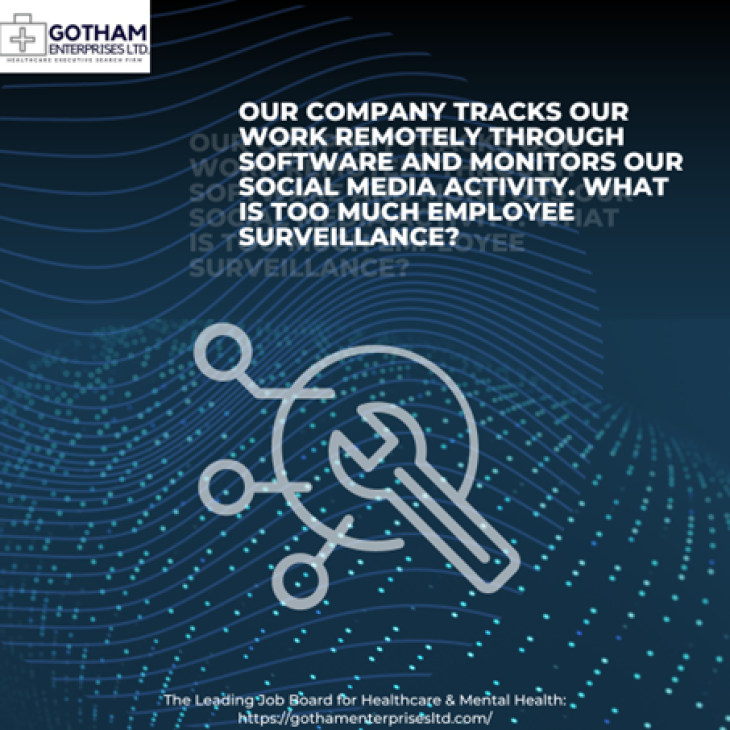Recent Posts
- I broke up with my partner, but now I am having doubts. Did I do it out of the right reasons or was I just being fearful?
- My Quick Temper Pushes People Away. What Do I Do To Manage My Anger?
- How does noise affect my mental health?
- I want to be a better problem solver. What is a step by step approach?
- Escapism. When is it healthy? When is it damaging?
Most Popular
Our Company Tracks Our Work Remotely Through Software and Monitors Our Social Media Activity. What Is Too Much Employee Surveillance?

Determining the appropriate level of employee surveillance is a complex matter. One that requires a balance between ensuring productivity and respecting employees' privacy rights. While some level of monitoring may be necessary for legitimate business reasons, there are considerations to keep in mind to avoid excessive surveillance. Here are some factors to consider when you are navigating this.
-
Legitimate business reasons are necessary. Employers should have clear and justifiable reasons for implementing surveillance measures. This may include ensuring data security, preventing misconduct or theft, complying with legal or regulatory requirements, or maintaining productivity.
-
Transparency and communication should be provided by employers to employees. Employers should be transparent about their monitoring practices and inform employees about the extent of surveillance. Clear communication helps establish trust and allows employees to understand the reasons behind the monitoring.
-
Proportional and targeted monitoring purposes should serve as the need for surveillance. Surveillance should be proportional to the intended purpose and targeted to specific areas of concern. Employers should avoid monitoring activities unrelated to work or invading employees' private lives.
-
For the employee’s sake, utilize privacy safeguards for their confidentiality. Employers should take steps to protect employee privacy and ensure the security of any collected data. This includes implementing appropriate security measures, restricting access to sensitive information, and anonymizing or encrypting data when possible.
-
Enforce consent and legal compliance. Employers should comply with applicable laws and regulations regarding employee privacy and surveillance. In some jurisdictions, obtaining informed consent from employees may be required for certain monitoring practices.
-
Emphasize the minimization of intrusiveness: Employers should strive to use less intrusive methods of monitoring whenever possible. For example, instead of monitoring social media activity, employers can focus on monitoring work-related applications and systems.
-
Respect for personal communication should be upheld. Employers should generally avoid monitoring personal communication channels, such as personal email accounts or private messages on social media platforms, unless there are compelling legal or security reasons to do so.
-
Ethical considerations also need to be taken into account. Employers should consider the ethical implications of monitoring, including the impact on employee morale, trust, and well-being. Excessive surveillance can create a negative work environment and erode employee satisfaction and productivity.
-
Consider the retention and disposal of data. Employers should establish policies for the retention and disposal of surveillance data. Data should be stored securely and only retained for as long as necessary to achieve the intended purposes.
-
Enforce regular review and assessment. Employers should periodically review their surveillance practices to ensure they remain justified, necessary, and compliant with applicable laws and regulations. This allows for adjustments and improvements based on feedback and evolving privacy standards.
It is crucial for employers to strike a balance between monitoring to protect their legitimate interests and respecting employees' privacy rights. Consulting with legal professionals who specialize in employment and privacy laws can provide guidance tailored to your specific jurisdiction and circumstances.
#EmployeeSurveillance #PrivacyRights #Productivity #LegitimateBusinessReasons #Transparency #Communication #TargetedMonitoring #PrivacySafeguards #Consent #LegalCompliance #Intrusiveness #PersonalCommunication #EthicalConsiderations #DataRetention #RegularReview #PrivacyLaws







Comments